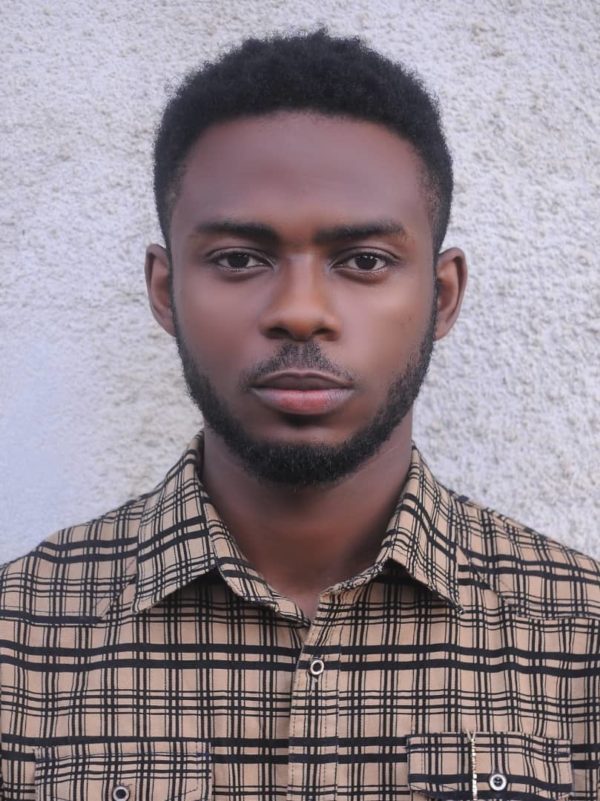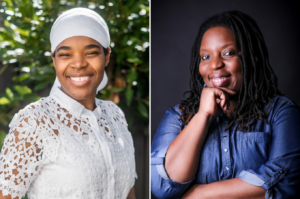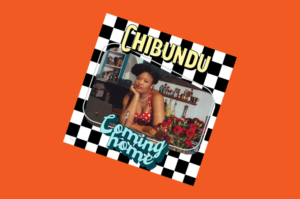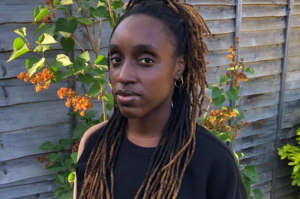
JK Anowe, a Nigerian-born poet, holds a BA in French from the University of Benin, Nigeria, where he was awarded the Festus Iyayi Merit Award for Poetry in 2015. He is Associate Poetry
Editor at Praxis Magazine Online. He lives, teaches, and writes from somewhere in Nigeria.
Following his win of the inaugural Brittle Paper Award for Poetry in 2017, for his Expound poem “Credo to Leave,” he was in conversation with Gaamangwe Joy Mogami, founder and editor of the Botswana-based interview magazine Africa in Dialogue. This conversation is taken from Africa in Dialogue‘s e-book of conversations with the 2017 winners of the Brittle Paper Awards, including Sisonke Msimang, Hawa Jande Golakai, Chibuihe Achimba, and Megan Ross.
_________________________________________________________________________
Gaamangwe Joy Mogami:
JK, congratulations for winning the Brittle Paper Award for Poetry. What did it mean to you to win this award?
JK Anowe:
I’m grateful for your kind words, Gaamangwe. Truly I am. Winning the Brittle Paper Award for Poetry was, at one point, an amazing experience, and at another, befuddling. I really wasn’t expecting to win. I know it somewhat comes off as a cliche because it is what most people say when they win stuff, but it is actually true. I didn’t expect to win. I mean, there were tricklings of hope here and there, but with the likes of Gbenga Adesina, Safia Elhillo, Nick Makoha, Romeo Oriogun etc. on the list, poets whose work are considered more urgent and socially relevant, I didn’t think I had a good chance.
And besides, it sort of acknowledged that relevance I’ve always wanted people to see in my works. I am one of those people, as I am often inclined to think, who get rejected more times than they are accepted for publication or awards, whose anticipation functions also in that same order. “Credo to Leave” was the only poem accepted for publication amongst all other pieces I sent out last year. I had sent it out the same day I finished writing it. Also, none of the agents I queried had emailed back. So imagine my surprise when it got accepted for publication, and months later, would go on to win an award. It was, and is still, truly amazing. It shows how often our works transcends us as artists. How these works may sometimes have a mind of their own, have plans of their own, a nucleus different from the artist.
Gaamangwe Joy Mogami:
I agree. Our art can transcend our expectations in unimaginable ways. I think it’s because other people don’t experience our art the ways we experience it or even expect them to experience it. Which is kind of the best part really. I am happy for you. How did “Credo to Leave” come to you? How was the process of writing it?
JK Anowe:
Well, I was listening to “Fall Away” by Twenty One Pilots when it came to me. Started off as a scattering of random words and phrases coming at me, hence the unlineal stream of consciousness that dominated the entire structure of the poem. Something I’d later come to describe as Schizo-Poetry: the conscious/subconscious inability to maintain a linear stream of thought for a considerable amount of time in a poem. Which is also a style Twenty One Pilots imbibes in their music. Sometimes all I need going for me is a line or an idea I perceive will be either at the start or finish of the poem, even though the most primal thing when I start out to write a poem is my art, my craft, i.e. utmost concentration on the creative execution of the subject matter, not on the subject matter itself. Other times, which is most times, a title, whether tentative or not, is enough. Though for this particular poem, the title had to come last.
I wrote it during an intense period of my lifelong struggle with clinical depression. And save for the preconceived notion that anything I set out to write would be poetry 80% of the time, I didn’t exactly know what I was writing. I was typing furiously on my phone, just wanting to get everything out: how I felt at that moment, how I’d always felt before that moment, how I’ll most likely feel after that moment and for the rest of my life. And it wasn’t until I finished writing that I’d found therein a filtering of hope, albeit bleak. It was this small speck of hope, or maybe a longing for it, that helped birth the title “Credo to Leave.” Which, if you ask me, was my way of telling myself I could get out of that murky place lurking with ennui and existential dread. So, I guess you could call “Credo to Leave” the proverbial three times a drowning man comes up for air before asphyxiation.
Gaamangwe Joy Mogami:
I resonate so much with the idea of Schizo-poetry and the way poems come to you. But, yes, “Credo to Leave” is raw and visceral and urgent perhaps because the feeling of existential dread is something familiar to a lot of us. I had many knotted lumps in my throat moments after reading it.
And now I wonder where or what the source of your existential dread originates from? What brings it to the surface? And what does that hope look like for you or what often gives you hope when you are within depression?
JK Anowe:
Haha! It’s really nice to know that you feel this way about my poem, Gaamangwe. It’s not something I hear often outside my small circle of friends. So it means quite a lot. In the wake of receiving the award, I was greeted with a lot of attention. Congratulatory messages. Praise-filled messages. Messages whose senders asked me to mentor them. Etcetera. Now this sort of public attention isn’t something I’m exactly new to (I had a similar experience when my digital chapbook, a parable for paranoia, was published for free downloads by Praxis Magazine Online two years ago), though I try as much as I can to avoid it. And I’ve never been used to this sudden
outburst of attention, being that it’s also similar to my fear of noise. Which is somewhat manageable if the source of said noise is particular, singular. The anxiety and irritation only kick in when it is the direct opposite, coming at me from all directions, so that I begin my faithful work of overthinking, and any form of unapproved proximity to me approximately turns me into an earthworm dipped in salt. (Laughs).
It’s crazy, really. Hope, being how it is, can be a cruel twisted thing, and doesn’t look like much from where I stand sometimes. Reason I’m very much inclined toward introversion and anonymity, almost
always have earphones plugged-in in public, and sometimes, never go to certain places alone. Listening to music, especially the ones ridden with melancholia, I’ve found for me, is oddly calming. Taking long walks that hurt my feet also helps to create that feeling of not ultimately being alone in the struggle. Reading works by Anne Sexton and Sylvia Plath, poets who had similar experiences in their lifetime, gives succour in these moments too. Because writing is often out of the question and isn’t at all a form of healing for me, sadly. I am unable to bring myself to write anything, to see beyond my present predicament and muster words. Thankfully, “Credo to Leave” is one of those very few poems I’ve been able to write in such situations.
Gaamangwe Joy Mogami:
I struggle to write when I am within existential dread too. I must be out of the dark to truly write. But then again writing truly terrifies me whenever I have to do it. Yet I profoundly love the damn thing. I find reading to be my saving grace in those moments. Existentialism says that we are all merely passengers in our own individual ships floating next to each other, fighting our own degrees of the storm, and, yes, sometimes we survive because our neighbors are shouting encouragement and understanding. There is both healing in shouting and hearing encouragement. It’s the reason we create art after all, right? I mean, why do you gravitate to writing poetry? What kind of poetry do you find yourself writing? What is on the other side of writing these poems for you?
JK Anowe:
Oftentimes, I’ve come in contact with folks who, in appreciation of my work, say they were able to achieve for themselves some sort of healing after engaging with said work. Now while I’m very much
grateful that I’m able to proffer this passageway, this “healing,” through what I’ve written, I’m somewhat perplexed by it. Don’t get me wrong. I’m not one to tell people how to approach or perceive my work or any work of art. In fact, I do believe that a poem no longer belongs to me the moment I drop my pen and say, okay I’m done here. But then again, healing, or the search for it, is not the reason I, to use your words, gravitate towards writing poetry.
I’ve always considered poetry the truest art form. Written or otherwise. Have always been of the notion that it exists in everything. That it belongs with the basic, [and can] neither be created nor destroyed, only harnessed.
It has fascinated me a long time how so much of feeling, so much of living, so much of being, could be captured with such little use of words, how something so economical and immaterial in structure and form could be one of the most honest ways of expression, resonating in ways certain basic human instincts are configured to be. Like blinking at a sudden burst of light. Or crying, especially in infants, to signify some sort of discomfort. And for me, it is nothing short of privilege that I’m able to harness this energy, like a spiritually rejuvenated monk returning from a solitary retreat in the mountains, to make new meanings of life, not as we know or have been taught to know it, but in the most honest way possible.
So writing poetry, personally, isn’t at all a proffering of healing as much as it is a form of documentation, of archiving the most human, individualist experience, to ask and re-ask questions. Which brings me to the idea of self-love and how ultimate it is perceived to be. A notion I strongly disagree with. I mean, humour me a time in the history of mankind when we, in the quest to come to terms with meaning, didn’t need some external phenomenon to show us a part of ourselves we didn’t already see or wasn’t able to see for ourselves. It has never been encompassing, this external validation, but it has always been a shadow, that even Gods clamour for validation, hence their adherents. Still, I can’t help but be drawn back to our discussion on how impossible it is to write while in the chaos of existentialism, which I’d call a remarkable, rewarding feat, because it is in this inability that everything, even our most dreadful of experiences, is made beautiful, more profound, through memory. To look back and say this is what I’ve been through, this is what I’ve survived. Because I believe, without an atom of doubt, that these narratives, these things we cannot name or place a finger on, that seem to have a life of their own and go on and on in our heads, should be articulated and heard. Because woe is to the society that does not pay heed to voices, whether distinct or not, just because they scream forth from a man’s head.
This is why I find myself on the confessional side of writing poetry. A
lifetime trajectory, I suppose, of archiving life experiences as I perceive them to be, and churning out works that allow readers a
glimpse into my own struggles with mental illness, relief being what waits for me on the other side of writing these poems, the closest and most fickle distance I may ever come to attaining healing. Because you know what? I’m fine with that. I think that for me relief is enough.
Gaamangwe Joy Mogami:
Relief is more than enough. It is a form of healing. But, most importantly, each one of us must carve that which we need to move to the next hours with some lightness. If we can be within our personal worlds better than we were in the moment past, then it is alright, you know? I find the idea of poetry as one of the basic units of existence really powerful. I mean, yes, poetry is in all things. And truly, in recognizing this, our lives become fuller and meaningful. And a lot of the human experience is about meaning-making. So when we see poetry all around us, we make the meaning of ourselves and lives potent and significant, and sometimes that is all we need to go through this strange beautiful messy thing called life. On meaning-making, what meanings have you discovered or created about your person-hood and experiences with mental illness, through and in poetry? And the bigger view, the meaning of life itself?
JK Anowe:
Well, meaning is something I still struggle with. And this struggle is very much apparent in my poetry, I begin to think of it as meaning itself. My confusion is nothing new, it’s not something I’m inclined to hide. I grew up in a very Christian, very Catholic household. So, I was nurtured in an environment that allowed little or no questioning of things deemed spiritual and holy. I mean, I have this memory as a boy where I asked my father where God came from, who was his father and mother, how he came to be, and he answered by telling
me to watch my tongue, that asking or even thinking of such things were sacrilegious. And that, believe it or not, threw me into more confusion. I was convinced something was wrong with this God, and, in a generic sense, with living.
Over the years, as I edged towards adulthood, I, in part, deviated from the tradition of my upbringing and carved a niche for myself, a niche that was neither entirely influenced by the former or by the world. I began to think maybe it wasn’t the God that was the problem but the way people perceived this God. Maybe it wasn’t life but the way people chose to live it.
Maybe we’re mostly the way we are as a result of the different ways we affect each other, not by some supernatural phenomenon. Poetry has been the only constant amidst the struggles with feeling displaced in a world largely built on the premise of identity. And I think what it has done is help me deal with my confusion, cartograph it best as I could. Nevertheless, I am still very much in the process of finding meaning. I believe we all are. At least, until we stop breathing.
Gaamangwe Joy Mogami:
I totally understand why the feedback from your father got you confused. Honestly, I had a similar experience. I was always asking and met with similar feedback. Religion, it seems, does not encourage exploration. Yet, God is the big unknown, how can we be expected to not want to explore this grand frontier? I don’t know though if our lives are not influenced by a certain supernatural
phenomenon. I see the supernatural even in what we call ordinary and mundane. From the phenomenon of night dreaming to the creation of poetry.
But, yes, like you, I think meaning is ever-evolving and folding. A lot of things are always continuous, re-born and re-created in new moments. It’s all grand and fascinating. Now, what poetry or writing projects have you been creating since winning the award?
JK Anowe:
I’ve completed a collection of poems since the award. It interrogates mental illness/existential dread, longing and loss in relation to the psyche/self, to the body, to God, to family, to country, and desire. And I’ve been struggling to start a novel too.
I also serve as Poetry Editor for Praxis Magazine Online‘s Poetry Chapbook Series, working on digital chapbook projects by poets who, I think, are nothing short of rewarding. And I really am excited about getting them published as part of the series of which I’m a pioneer.
Gaamangwe Joy Mogami:
I am excited to read your collection of poems as soon as it gets published. It explores my favorite topics! I am also happy for your role as a poetry editor. We need more poetry chapbooks published. New voices, new perspectives and new understandings of our human experience. JK, thank you so much for joining me here. I am forever shifted.
JK Anowe:
Thank you, Gaamangwe. For your kind words. For your insightful comments/questions. I will make sure to send you signed copies when it’s published. I really enjoyed having this conversation with you. And I wish you well in all your present and future endeavour. Cheers.
_________________________________________________________________________
Download: AFRICA IN DIALOGUE INTERVIEWS THE 2017 BRITTLE PAPER AWARD WINNERS









8 Must-read Expository Interviews with Prominent African Writers - EBOquills May 04, 2020 11:33
[…] 1. On Confessional Schizo-poetry and Finding Meaning: In Conversation with JK Anowe, Winner of the 2017…. […]